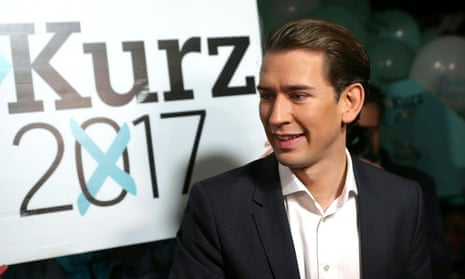Austria’s centre-left chancellor is battling allegations that his party paid for a group of websites churning out xenophobic and antisemitic conspiracy theories in order to discredit his main challenger in the eyes of far-right supporters.
The scandal, which has rocked Austrian politics two weeks before the country goes to the polls to elect a new government, centres on at least two Facebook sites dedicated to the centre-right foreign minister and candidate for chancellor, Sebastian Kurz.
One of them, called The Truth About Sebastian Kurz, which had about 16,000 followers, posted Photoshopped images and video clips accusing the politician of secretly paving the way for a new wave of immigration from Islamic countries, and of being part of the “dubious political network” of the Hungarian-American financier George Soros.
Another site, For Sebastian Kurz, masqueraded as a website run by supporters of the Austrian People’s party (ÖVP) candidate but published controversial content such as a poll on whether the government should close its border on the Brenner pass in the light of NGOs allegedly threatening to smuggle thousands of migrants from Italy into Austria.
Kurz, who has campaigned on a promise to strengthen the EU’s outer borders and end rescues of refugees in the Mediterranean, is leading in opinion polls by a considerable margin and is widely expected to be become his country’s youngest ever head of government, at the age of 31, after elections on 15 October.
Over the weekend the investigative magazine Profil alleged that the two websites targeting Kurz were run not by rightwing or far-right activists but by a former adviser to Austria’s current chancellor, Christian Kern, of the Social Democratic party for Austria (SPÖ).
Kern hired Tal Silberstein, an Israeli political adviser, for a fee of €400,000 to mastermind his election campaign. But Silberstein was fired from the chancellor’s team on 14 August after being investigated over alleged money laundering in Israel. He denies wrongdoing in the Israeli case. Austrian media allege that Silberstein’s team continued to operate the websites even after the party had cut ties with him.
Silberstein extolled the virtues of negative campaigning in the 2005 documentary Our Brand is Crisis, about the 2002 Bolivian presidential election. Then working for the US pollster Stanley Greenberg’s team of advisers, Silberstein was caught on camera telling the candidate Gonzalo Sánchez de Lozada to “start negative campaigns” against his main rival without being seen as the campaign’s instigator. “We have to make him from clean to a dirty candidate, that’s our task,” he was heard to say.
In Austria, which has a multi-party system and proportional representation, openly negative campaigning has traditionally been taboo.
The SPÖ general secretary and campaign manager, Georg Niedermühlbichler, resigned on Saturday in the immediate wake of the revelations around the so-called Schmutzkübel (dirt bucket) campaign.
Kern has said he was unaware of the Facebook sites, which he described as “amoral and incredibly stupid” – a denial supported by Silberstein himself.
“The chancellor did not even have the slightest bit of knowledge or information,” Silberstein told Austrian media. “It is now part of the opposition’s own negative campaign to accuse the chancellor and the SPÖ.” Officially, he had been commissioned to analyse and interpret polling data, he said.
Kern announced on Sunday that his party would release Silberstein’s contract to the public, but by Wednesday evening it had not done so.
Silberstein has not denied running the sites in interviews with Austrian media and said that rather than negative campaigning his intention was to gather data and test out different messages. “The strange thing is that people from other parties have been used to steal information, and everyone gets worked up about the Facebook sites,” he reportedly said.
As early as July, Kurz’s ÖVP had asked Facebook to delete posts from the two sites, but neither went offline until after Saturday’s revelations in the media.
A third site, The Truth About Christian Kern, targets the incumbent chancellor, though a social media analyst quoted in Die Presse newspaper said it was unlikely to be run by the same people.
Facebook has so far declined to comment specifically on the scandal that could influence the outcome of the Austrian elections, stating only that there are “well-functioning processes” for lodging complaints.
